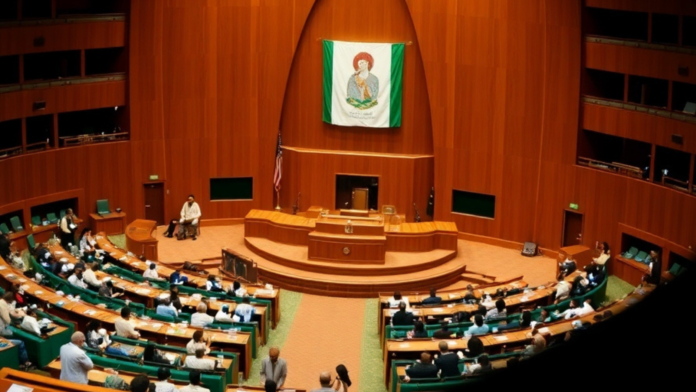The Nigerian National Assembly is a crucial institution in the country’s political landscape, serving as the legislative arm of government and playing a pivotal role in the formulation, passage, and oversight of laws. Established under the Nigerian Constitution, the National Assembly is composed of two houses: the Senate and the House of Representatives. Together, they are tasked with a range of responsibilities that contribute to the smooth functioning of the democratic process, ensuring checks and balances, and safeguarding the rule of law in Nigeria.
Composition of the National Assembly
The National Assembly consists of two chambers:
1.The Senate: The upper house, with 109 senators, is made up of representatives from the 36 states and the Federal Capital Territory (FCT). Each state elects three senators, while the FCT elects one. The Senate is led by a President who is elected by the senators.
2.The House of Representatives: The lower house has 360 members, who represent constituencies across the country. Each representative is elected for a four-year term. The Speaker of the House presides over the sessions of the House of Representatives.
The National Assembly is responsible for ensuring that both legislative houses work collaboratively to formulate laws, review executive policies, and represent the interests of Nigerians.
Key Functions of the Nigerian National Assembly
The National Assembly’s functions can be divided into several core areas:
1.Legislation
At the heart of the National Assembly’s duties is the passage of laws that govern the country. Legislators propose, review, and amend bills, which can be introduced by members of the National Assembly or by the executive. Once a bill is passed by both the Senate and the House of Representatives, it is sent to the President for assent. If the President assents, the bill becomes law. If the President refuses assent, the National Assembly may override this veto with a two-thirds majority.
Legislation covers a wide range of areas, including economic policies, human rights, education, healthcare, security, and environmental protection. For instance, the National Assembly plays a critical role in passing the annual budget and in creating laws that regulate the country’s financial and monetary systems.
2.Representation of the People
Members of the National Assembly are elected to represent the interests of their constituents at the federal level. As representatives, they serve as a direct link between the Nigerian people and the government, bringing to light the concerns, challenges, and needs of their respective regions. Legislators often raise issues that affect their constituencies, propose solutions, and advocate for policies that promote social, economic, and infrastructural development.
This role also includes holding town halls and engaging with constituents to better understand their issues and relay these concerns to the broader national discussion.
3.Oversight of the Executive
One of the most critical roles of the National Assembly is its power of oversight over the executive branch of government. The legislature has the constitutional authority to scrutinize the activities of the executive, ensuring transparency, accountability, and good governance.
Through committees, the National Assembly can summon ministers and heads of government agencies to answer questions about their policies, expenditures, and implementation of government projects. The oversight function helps prevent corruption, inefficiency, and abuse of power by holding government officials accountable for their actions. For example, the National Assembly regularly reviews government spending and investigates the use of public funds.
4.Impeachment and Removal of Public Officials
The National Assembly has the constitutional authority to remove key public officials, including the President, Vice President, and judicial officers, through impeachment proceedings. If the President or Vice President is found guilty of gross misconduct, the National Assembly can initiate impeachment procedures, which requires a two-thirds majority in the House of Representatives and the Senate to succeed. This power is an essential mechanism for ensuring that public officials uphold the law and their oath of office.
Similarly, the National Assembly can also remove other public office holders, such as the Chief Justice of Nigeria, through similar procedures, thereby ensuring that checks and balances are maintained within the Nigerian political system.
5.Approval of the National Budget
The National Assembly plays an essential role in approving the national budget, which is proposed by the executive branch. The budget defines the allocation of resources to various sectors, including defense, education, healthcare, infrastructure, and social services. Members of the National Assembly debate and scrutinize the budget to ensure that it aligns with national priorities and is in the best interest of the Nigerian people. Any proposed budget must be passed by both chambers of the National Assembly before it becomes law.
6.Constitutional Amendments
Amending the Nigerian Constitution requires the involvement of the National Assembly. The process of constitutional amendment is a complex and rigorous procedure that requires a two-thirds majority in both the Senate and the House of Representatives, as well as the approval of at least 24 of Nigeria’s 36 states. Through this process, the National Assembly has the power to make adjustments to Nigeria’s legal framework to adapt to changing societal needs and values.
The National Assembly as a Check on the Executive
In Nigeria’s presidential system of government, the National Assembly serves as a critical check on the powers of the executive. It ensures that the executive does not wield unchecked power, which could lead to authoritarian rule or misuse of state resources. The legislature’s oversight powers enable it to monitor and evaluate executive actions, such as government spending, the implementation of policies, and national security matters.
Through its investigative functions, the National Assembly can hold the executive accountable for actions that may not be in the public’s best interest. In this way, the legislature plays a vital role in protecting democracy and ensuring the smooth functioning of the Nigerian state.
Challenges Facing the National Assembly
Despite its significant role, the Nigerian National Assembly faces several challenges:
-Corruption: Like other branches of government, the National Assembly has struggled with corruption. There have been numerous allegations of misuse of public funds, bribery, and embezzlement, which have eroded public trust in the institution.
-Inefficiency: The National Assembly has often been criticized for being slow in passing important bills and for its frequent adjournments. Legislative gridlock and partisan disagreements sometimes hinder the effective functioning of the assembly.
-Lack of Capacity: Many members of the National Assembly lack the technical expertise or administrative experience needed to fully understand complex policy issues, which sometimes hampers the quality of their legislative work.
-Political and Partisan Divisions: Nigeria’s politics is deeply divided along ethnic and regional lines, and these divisions often spill over into the National Assembly. Partisan politics can lead to delays in passing key legislation, as lawmakers prioritize the interests of their political parties over national concerns.
Conclusion
The Nigerian National Assembly is a cornerstone of Nigeria’s democracy. It serves as the voice of the people, ensures checks on the executive, plays a critical role in lawmaking, and is responsible for the oversight of government functions. Despite its challenges, it remains vital in maintaining the balance of power and ensuring that the Nigerian government is accountable to the citizens it serves. For the country to realize its full democratic potential, the National Assembly must continue to evolve, improve its transparency, and strengthen its commitment to serving the public interest.




